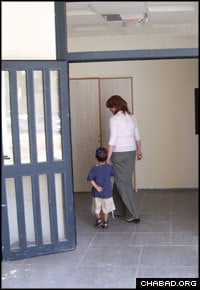With the opening of the Shlavim Center in Israel, more than 120 children with special needs and their families now have a collective second home.
Its name translating to “paths,” the newest educational institution to be established in Ashkelon – a seaside city along Israel’s southern Mediterranean coast – provides therapeutic classes and activities to children struggling with behavioral and developmental issues, whether they be physical, cognitive or neurological. A hallmark of the center, say stakeholders, is its added attention to single-parent and underprivileged families, and other families in distress.
“We are very pleased with the new school,” says Yosef Marshvili, whose four-year-old daughter Orly – who has speech and motor difficulties – is entering the older group at the center’s therapeutic nursery school.
Orly spent the previous year in a similar program run by Chabad-Lubavitch of Ashkelon, which directs the new center.
“Thank G‑d she has improved, she has started to speak,” adds Marshvili, who is confident that he and his wife Rachel will see even more progress this year.
Natali, a mother of a five-year-old girl in the same class, agrees.
“I believe that they will continue to treat and care, and give all their resources,” says the mother, who preferred to not give her last name out of concerns for her family’s privacy.
The mother’s daughter, as well, attended the Chabad program last year. She says that she noticed the child was developing slower than her peers as a baby, so she first augmented a regular daycare with physiotherapy. She tried two different programs before the therapeutic nursery run by Chabad opened its doors, and she hasn’t looked back.
“It was worth the wait,” says Natali. “We see their work and efforts as blessed, and as providing a lot of attention for the children.”
“Often parents have to decide between special education and religious education,” adds Chani Vilenkin, program director at the Shlavim Center. “Here, they don’t have to compromise.”
At the new center, morning programming revolves around the two therapeutic nurseries that serve a combined total of 55 children, aged three to five. Afternoon and evening programs, meanwhile, are devoted to some 72 older children who attend other schools during the day.
The goal, says Vilenkin, is to see at least 20 percent of the children fully integrated into mainstream education.
A Variety of Treatments

Throughout the year, staff at the center will visit the five daycare centers operated by Chabad-Lubavitch of Ashkelon to identify children with special needs and, with parents’ permission, administer diagnostic tests and transfer them to the Shlavim Center.
“We believe very strongly that if we can help children when they are very young, then we can help them integrate back into school as more confident students,” says Rabbi Menachem Lieberman, executive director of Chabad-Lubavitch of Ashkelon.
Children with undiagnosed and untreated needs tend to develop anxiety and a lack of self-esteem, explains Lieberman. This leads to decreased participation in school, isolation, and frustration on the part of the child.
“The earlier we catch and deal with an issue, the easier it is to help.”
Shlavim’s integration program features a standard daycare operation where children with special needs are given the opportunity to form positive relationships and emulate other children through exposure to their speech and behavior.
The facility also boasts the ability to support several different therapeutic regimes, from art to music, motor-building skills, massage therapy, communication exercises, physiotherapy and psychotherapy. In addition, a petting zoo that includes rabbis, hamsters and parrots is designed to assist children in learning responsibility and building environmental awareness.
A second floor, that is set to open in Octoper, will house a snoezelen sensory room that will offer controlled multisensory stimulation for children with autism-type disorders. All of the center’s 14 therapy options are coordinated with the Israeli Ministries of Health and Education, as well as the Child Development Center at Barzilai Hospital and Israel’s National Health Institute.
“As the operators of the largest nursery school network in Ashkelon, and with nearly 30 years of experience in the field of education,” says Lieberman, “we have faced the immense need of parents to children of special needs who do not receive treatment. Every child should receive an education sensitive to his or her needs.”




Start a Discussion